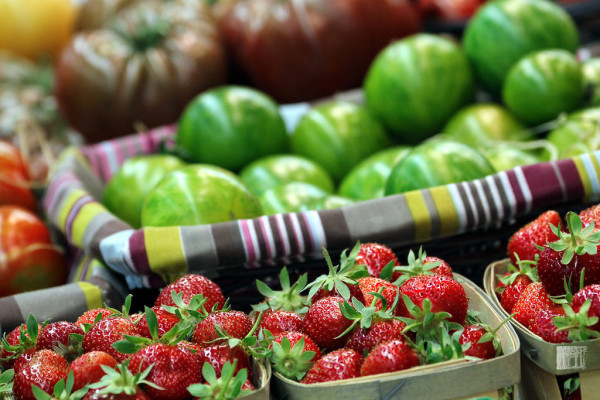Many of us know that heavily processed foods, often loaded with sugar and saturated fat, are bad for our bodies. What people may not realize, however, is that even seemingly healthy foods, such as nuts, meat, dairy, and fruit, can threaten our health if their production negatively impacts the environment. This article tackles four of the biggest environmental issues of our time–the shrinking water supply, climate change, pesticide contamination, and deforestation–and explains the impact they have on public health. Additionally, each section is accompanied by a list of the worst offenders, food products that aggravate environmental problems and likewise increase the risk of health consequences.
Water Wasters: almonds, avocados, beef, asparagus, lentils, dairy, pork, walnuts, plums, apricots, cherries, sweet potatoes
As one of the most severe droughts in California’s history persists and more than half of the world’s largest aquifers are emptied faster than they’re refilled, many worry that we will soon run out of fresh water. Obviously, water’s most important job is preventing fatal dehydration. However, clean water supplies also protect us from life-threatening diseases like diarrhea, malaria, and malnutrition.
Image Source: Bloomberg
Climate Changers: lamb, beef, pork, cheese, canned tuna, farmed salmon, potatoes, chicken, eggs
Perhaps the biggest environmental concern at this time is climate change, which impacts human health in a number of ways. More severe heat waves increase dehydration and heat stroke deaths, especially in urban areas. At the same time, warmer temperatures increase air pollution, which can cause respiratory health problems like asthma and chronic lung disease. More extreme weather events, like floods and storms, may cause mass injury and death and also increase the prevalence of air and water-borne diseases. Foods that have the biggest impact on climate change are determined by their carbon footprint, or the amount of greenhouse gases released as a result of their production.
Pesticide Packers: strawberries, apples, grapes, peaches, nectarines, potatoes, celery, sweet bell peppers, cucumbers, cherry tomatoes, imported snap peas, spinach
Pesticides pose a risk not only when present on fruits and vegetables, but also when they contaminate the soil and water supply. According to the EPA, pesticides may affect the hormone, nervous, and endocrine systems, irritate the eyes and skin, or be carcinogenic (cancer-causing).
Habitat Haters: palm oil, genetically modified corn, beef, sugar
Finally, we’ve reached one of the original environmental issues: deforestation and loss of biodiversity. The quest for palm oil, which is estimated to be present in 50% of all packaged foods, has led to the destruction of eight million acres of rainforest in Indonesia and Malaysia. In terms of public health, deforestation destroys medicinal plants that can be used to make pharmaceuticals, pollutes the air with wood smoke, releases excess carbon into the atmosphere, and promotes the spread of disease. In Indonesia alone it is said that carbon emissions, as a result of deforestation, exceeds the level of pollution created by all US cars, ships, planes, and trucks.
With all of this information, you may be thinking, “What can I eat?!” While it’d be convenient if we all had the time and money to avoid every environmentally-damaging product, many of us simply don’t. This does not mean, however, that you can’t make an impact! Even one change in your diet can reduce environmental damage and preserve the health of people worldwide. Want the most bang for your buck? Consider reducing or eliminating one of the most harmful foods like palm oil, beef, or dairy.
Feature Image Source: Jan Buchholtz










